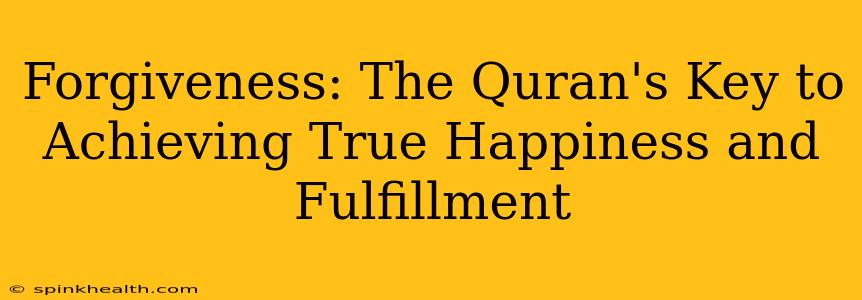Forgiveness, a cornerstone of numerous faiths, holds a particularly prominent place within Islam. The Quran, the holy scripture of Islam, repeatedly emphasizes the importance of forgiveness, not just for others, but also for oneself. This isn't simply a moral precept; it's a pathway to inner peace, emotional well-being, and ultimately, true happiness and fulfillment. This exploration delves into the Quranic perspective on forgiveness, examining its profound impact on individual and societal well-being. We'll explore how practicing forgiveness aligns with the core teachings of Islam and unravels its transformative power on our lives.
What Does the Quran Say About Forgiveness?
The Quran frequently encourages forgiveness, portraying it as a divine attribute and a crucial characteristic of believers. Verses such as 7:199 illustrate God's boundless mercy and forgiveness: "And those who, when they commit an evil or wrong themselves, remember Allah and ask forgiveness for their sins – and who can forgive sins but Allah? – and do not persist in what they have done, knowing [that they are guilty]." This verse highlights the importance of seeking forgiveness from God and refraining from repeating harmful actions. The emphasis is not just on asking for forgiveness but on genuine repentance and a commitment to change.
Numerous other verses throughout the Quran emphasize the virtue of forgiving others. For example, the concept of Istighfar (seeking forgiveness from Allah) is frequently mentioned, highlighting its significance in purifying the soul and drawing closer to God. The Quran also explicitly instructs Muslims to forgive those who have wronged them, mirroring God's own forgiveness. This act of forgiveness is not merely a passive act of letting go; it's an active choice that requires compassion, empathy, and a willingness to overcome resentment.
How Does Forgiveness Lead to Happiness and Fulfillment?
The Quranic emphasis on forgiveness is not merely idealistic; it's deeply practical. Holding onto anger, resentment, and bitterness consumes emotional energy and prevents genuine happiness. Forgiving others, however, frees us from this burden. It allows us to break free from the cycle of negativity and embrace a more peaceful and fulfilling life.
Holding onto grudges: This leads to stress, anxiety, and even physical health problems. The Quran teaches that forgiveness is a powerful antidote to these negative emotions.
Building stronger relationships: Forgiveness is crucial for maintaining healthy relationships. It allows for reconciliation and fosters understanding, strengthening bonds between individuals and communities.
Spiritual growth: Forgiving others reflects God's own attribute of forgiveness, bringing us closer to Him and fostering spiritual growth. This sense of connection contributes significantly to inner peace and contentment.
Inner peace: Forgiving oneself is equally, if not more, important. The Quran teaches that we are all susceptible to errors and mistakes. Self-forgiveness allows us to learn from past mistakes without being consumed by guilt and self-recrimination. This, in turn, fosters self-acceptance and inner peace.
What if Someone Doesn't Deserve Forgiveness?
This is a common question, and the Quran doesn't advocate for condoning harmful actions. Forgiveness does not necessitate reconciliation or condoning the behavior; instead, it focuses on releasing the emotional burden that the anger and resentment place on the individual. Justice may still be sought through appropriate channels, but holding onto the anger is detrimental to one's well-being. The emphasis is on inner peace and letting go of the negativity, not on enabling harmful behavior.
How Can I Practice Forgiveness?
Practicing forgiveness is a process, not a one-time event. It requires conscious effort, patience, and self-reflection. Here are some practical steps:
- Acknowledge your feelings: Don't suppress your emotions. Allow yourself to feel the anger and resentment but don't let them consume you.
- Understand the other person's perspective: Try to empathize with the other person's motivations, even if you don't agree with their actions.
- Pray for forgiveness: Seek guidance and strength from God through prayer.
- Practice self-compassion: Forgive yourself for any role you may have played in the situation.
- Focus on the positive: Concentrate on the good things in your life and the positive relationships you have.
Is Forgiveness Mentioned in Other Parts of Islamic Teachings?
Yes, the concept of forgiveness is deeply ingrained in Islamic teachings, extending beyond the Quran to include the Sunnah (the teachings and practices of Prophet Muhammad). Prophet Muhammad (peace be upon him) exemplified forgiveness in his own life, providing a powerful model for Muslims to follow. His life and teachings constantly reiterate the importance of this virtue.
What are the Benefits of Forgiveness in a Societal Context?
The societal benefits of forgiveness are profound. It contributes to building stronger, more cohesive communities characterized by peace, harmony, and mutual respect. It fosters reconciliation after conflicts, promotes social justice, and reduces violence and crime. A society that values forgiveness is a healthier and more prosperous society.
In conclusion, forgiveness, as highlighted throughout the Quran, isn't merely a moral virtue; it's a pathway to profound personal growth, emotional well-being, and societal harmony. By embracing forgiveness, we unlock the door to true happiness and fulfillment, aligning ourselves with the divine attributes of mercy and compassion. It's a journey of self-discovery and spiritual enrichment, one that leads to a richer and more meaningful life.

